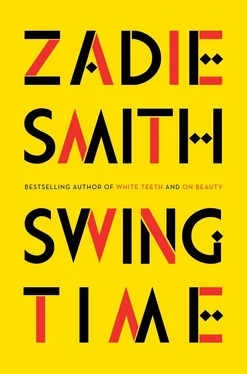“Is that it? Lamin, is that it?”
The girl stopped her chattering and turned to look at me. She could tell I was no age mate. She examined the drab, utilitarian clothes I had bought especially for wearing in her country: olive cargo pants, long-sleeved wrinkled linen shirt, an ex-boyfriend’s battered old pair of Converse and a black scarf I’d felt silly and self-conscious wearing and so had slipped off my head and now wore round my neck.
“That is a container ship,” she said, with undisguised pity. “You miss the last ferry.”
We paid what Lamin considered an exorbitant amount for our narrowboat passage, despite fierce negotiations, and the moment my giant boy lowered me on to my seat a dozen young men appeared from nowhere and joined us, sitting on every viable piece of the boat’s frame and transforming us from private water taxi into public boat. But on the other side of the water, my network reappeared and we learned that Aimee had decided to stay in one of the beach hotels and set out for the village tomorrow. The giant boy was delighted: we paid him again and thus subsidized another trip for some local kids, sailing back the way we’d come. Once on shore, we made our way finally to the village, in a beat-up minibus. The idea of two boats and two cabs in a single day was excruciating to Lamin, even if I paid for the second ride, even if the price quoted — which made him wince — would not buy me a bottle of water on Broadway. He sat on the roof of the vehicle, with another boy who could not be squeezed in, and as my fellow passengers talked and slept and prayed and ate and fed babies and shouted at the driver to let them off at what appeared to me to be completely deserted intersections, I could hear Lamin beating out a rhythm on the roof, over my head, and for two hours it was the only language I understood. We reached the village after ten. I was staying with a local family, and had never been outside their compound at that hour, or realized the total darkness that surrounded us, through which Lamin walked now with complete confidence, as if it were floodlit. I scurried behind him through the many narrow, sandy, trash-strewn paths I could not see, past the corrugated-iron sheets that marked each breeze-block single-story compound from the next, until we reached the Al Kalo’s compound, no grander or taller than the rest, but with a large open wasteground in front of it, in which at least a hundred children, in the uniform of their school — the school we were here ultimately to replace — huddled under the canopy of a single mango tree. They’d waited six hours to do their dance for a woman called Aimee: now it fell to Lamin to explain why this lady would not be arriving today. But when Lamin had finished speaking the chief appeared to want it explained to him all over again. I waited as the two men discussed the matter, their hands moving in an animated way, while the children grew ever more bored and agitated, until the women lay aside the drums they would not now play and told the children finally to stand, and in dribs and drabs sent them running back to their homes. I held up my phone. It cast its artificial light over the Al Kalo. He was not, I thought, the great African chief Aimee had in her mind. Small, ashy, wrinkled and toothless, in a threadbare Man U T-shirt, tracksuit bottoms and plastic Nike house slippers held together with gaffer tape. And how surprised the Al Kalo would be, in turn, to hear what a figure he had become for us all, in New York! It had started with an e-mail from Miriam — subject heading: Protocol —which outlined, in Miriam’s view, what any visitor to the village must present to its Al Kalo upon arrival, as a mark of respect. Scrolling through it, Judy released her seal-bark and put her phone in my face: “This a joke?”
I read the list:
Reading glasses
Paracetamol
Aspirin
Batteries
Body wash
Toothpaste
Antiseptic cream
“Don’t think so… Miriam doesn’t make jokes.”
Judy smiled fondly at her screen: “Well, I think we can swing that.”
Not many things charmed Judy, but that list did. It charmed Aimee even more, and for a few weeks afterward, whenever any good people of means visited us, in the Hudson Valley house, or in Washington Square, Aimee would repeat this list with mock-solemnity and then ask everybody present if they could even imagine, and everybody would confess they could hardly even imagine and seemed very moved and comforted by this failure to imagine, it was taken as a sign of purity, both in the Al Kalo and in themselves.
“But it’s just so challenging to make that translation,” commented a young man from Silicon Valley, on one of these nights — he was leaning over the dining table into a candle centerpiece and his face seemed lit from below with his own insight—“I mean, between one reality and the other. Like passing through the matrix.” Everybody at the table nodded and agreed that it was, and later I caught Aimee seamlessly adding this dinner-party line to her recitations of the Al Kalo’s now famous list, as if it were her own.
“What’s he saying? ” I whispered to Lamin. I was tired of waiting. I lowered my phone.
Lamin put a hand gently on the chief’s shoulder, but the old man continued to make his endless, agitated address to the darkness.
“The Al Kalo is saying,” Lamin whispered, “that things are very difficult here.”
• • •
The next morning I went with Lamin to the school and charged my phone in the headmaster’s office, through the sole outlet in the village, run on a solar-powered generator and paid for by an Italian charity years earlier. Around midday network mysteriously reappeared. I read through my fifty texts and established I had two more days alone here before I would have to go back to the ferry and collect Aimee: she was “resting” in a city hotel. At first I was excited by this unexpected solitude, and surprised myself with all kinds of plans. I told Lamin I wished to go to the famous compound of the rebel slave, two hours away, and that I wanted to see at last, with my own eyes, the shore from which the ships had left, carrying their cargo of humans, destined for my mother’s island, and then on to the Americas and Britain, bearing the sugar and the cotton, before turning back again, a triangle that had produced — among its numberless consequences — my own existence. Yet two weeks earlier, in front of my mother and Miriam, I had called all of this, contemptuously, “diaspora tourism.” Now I told Lamin I would ride a minibus unaccompanied to the old slave forts that once held my ancestors. Lamin smiled and seemed to agree but in practice stepped between all such plans and me. Between me and all attempted interactions, personal or economic, between me and the incomprehensible village, between me and the elders and me and the children, meeting any questions or requests with his anxious smile and his favored — whispered — explanation: “Things are difficult here.” I was not allowed to walk into the bush, pick my own cashews, help cook any meals or wash my own clothes. It dawned on me that he saw me as a sort of child, someone to be treated with kid gloves and presented with reality by degrees. Then I realized everyone in the village thought of me that same way. Where grandmothers crouched to eat from the communal bowl, resting on their powerful haunches, gathering up rice and scraps of ladyfish or garden egg in their fingers, I was brought a plastic chair and a knife and fork, because it was assumed, correctly, that I would be too weak to assume the position. As I poured a full liter of water down the drop toilet, to flush out a cockroach that disturbed me, not one of the dozen young girls I lived with ever let me know exactly how far she’d walked that day for that liter. When I snuck off by myself, to the market, to buy a red-and-purple wrapper for my mother, Lamin smiled his anxious smile but spared me the knowledge of what proportion of his yearly teacher’s salary I’d just spent on a single piece of cloth.
Читать дальше












